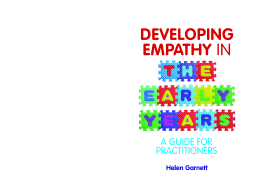
BOOK
Developing Empathy in the Early Years
Helen Garnett | Helen Lumgair | Jackie Harland | Valerie Lovegreen
(2017)
Additional Information
Book Details
Abstract
Winner of the Professional Books category in the 2018 Nursery World Awards.
Empathy is an essential part of being human: it allows us to connect with others, which in turn opens doors for us to happiness and success. Though everyone is born with an inherent capacity for empathy, children have the power to grow and re-build their natural supply, and even 'learn' to be more understanding towards others.
This pithy and practical guide provides early years professionals with the tools to make empathy the foundation for their work. It reveals where the roots of empathy lie, how to prioritise it in practice, and how it manifests itself in young developing brains. It includes simple teaching strategies and creative ideas for empathy-building games and activities, enabling you to help children grow up as happier, friendlier, more thoughtful individuals. This book is an essential resource for anyone working with small children.
This book by Helen Garnett is genuinely very interesting. It's packed full of history, quotes, facts and strategies and I have learnt so much from it.
...I particularly loved the superb strategies suggested in this book. They include ways to help preschool age children develop their theory of mind - which is fascinating.
Special Educational Needs Resources Blog
How wonderful - finally a passionate, scholarly yet practical book focusing solely on the pivotal importance of adults understanding and developing empathy in very young children. Helen Garnett has contributed an exciting seminal book which deserves very serious attention from the world of Early Years practitioners and parents. It is that rare creature - a book that balances excellent research into empathy with excellent practical ways of putting all the ideas into practice. It is a 'must-have' for all people wanting the best future for children.
Jenny Mosley, previously a lecturer on a Master’s in Education, author and Early Years Consultant
This book is very timely indeed. As the world around us grows ever more divisive and as convenience and immediacy take a tighter hold on our lives, as we give ever more of ourselves away on social media, we are in danger of creating a shallow, loveless, empty world that places no value on feelings and where childhood faces corrosive and combative forces that we will struggle to deter...
There is a great deal of wisdom here, and ways to help you turn the tide to start planting the seeds of empathy deep into 'the pedagogy of your preschool'. Kind and considerate children are developed where kindness and consideration are practised; tolerant and cooperative children thrive in an environment where tolerance and cooperation are evident.
Early Years Educator (EYE)
This is the perfect book for early years practitioners who want to better understand the importance of empathy.
Dr. Suzanne Zeedyk, Development Psychologist, Research Scientist, Founder of connected baby
Helen Garnett is a teacher with thirty years' experience. After running her own preschool for ten years, she became an educational consultant to Riverston Group Ltd and Think Equal. Helen is based near Brighton, England.
This is a powerful, passionate and practical appeal to humanize education for the sake of all of our children.
Sir Ken Robinson, Educator, New York Times Best Selling Author
Research-based and full of practical applications, this is a book that really brings the child to the forefront of how practitioners care for children... It is well written and easy to follow, with plenty of background material. The book is well supported by extensive references which will help those who want to look into the subject in more depth.
Parents in Touch
Table of Contents
| Section Title | Page | Action | Price |
|---|---|---|---|
| Developing Empathy in the Early Years: A Guide for Practitioners by Helen Garnett | 5 | ||
| Introduction | 9 | ||
| 1. Empathy in the 21st Century | 13 | ||
| 2. Affective and Cognitive Empathy | 31 | ||
| 3. Empathy and Theory of Mind by Jackie Harland | 49 | ||
| 4. Establishing Empathy in our Pedagogy | 63 | ||
| 5. Exploring the Relationship between Emotional Intelligence and Empathy | 79 | ||
| 6. How Conflict and Conflict Resolution Produce Empathetic Children | 97 | ||
| 7. The Power of Positive Communication | 113 | ||
| 8. The Significance of Pretend Play in Developing Empathy | 135 | ||
| 9. Fostering Empathy through the Process of Narrative by Helen Lumgair | 151 | ||
| 10. How Social Cognition Creates Engaged Children by Valerie Lovegreen | 171 | ||
| 11. Empathy and Autism | 187 | ||
| Afterword | 209 | ||
| Appendix: Reinforcement Inventory | 215 | ||
| Index | 217 | ||
| Blank Page |
